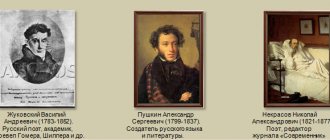Article on the topic
Date at Tendra's.
How Admiral Ushakov cured the Turks of pride 197 years ago, on October 14, 1817, on the feast of the Intercession of the Most Holy Theotokos, a Tambov landowner, who traces his ancestry to Prince Rededi, the leader of the Caucasian people of the Kasogs, the ancestors of the current Adyghe people, died. The event is not God knows what, if you do not mention the name of the landowner. And his name was Fedor Ushakov .
The main thing here is to avoid confusion. Our history, at least church history, knows two saints who bear the name Fyodor Ushakov. True, one is glorified as a venerable man, and the other as a holy righteous warrior. The coincidence is quite rare. Especially when you consider that one Fyodor Ushakov was the other’s uncle. You won’t find such family holiness during the day - offhand you can only remember the holy brothers Boris and Gleb and the spouses Peter and Fevronia of Murom .
Saint and Zugunder
We are more interested in the nephew, that is, the holy righteous warrior Fyodor Ushakov, who, by the way, for a significant period of his life bore the completely Muslim, Arabic title of “al-miraal,” which translated means “lord of the seas.” In the European tradition, this rank was somewhat changed into the familiar admiral.
Article on the topic
A tragedy turned triumph. "Chelyuskin" died because of Otto Schmidt's mistake?
When so many contradictory factors converge in one person, it becomes clear that we have before us a unique figure. If we add one more thing, it turns out that Fedor Fedorovich was unique in the square, if not in the cube. Both as a person and as a military leader.
And you can add a lot. Well, for example, here’s a quote from Ushakov’s own report: “Thanks be to God, during all the aforementioned battles with the enemy and during the entire time the fleet was under my command at sea, not a single ship from that fleet was lost and not a single person from our servants was captured by the enemy.” didn’t get it.” Are there naval commanders in all of world history who can boast of such achievements?
Of course, the ill-wisher will mutter with disgust that, they say, the enemy may not have captured his sailors. But, probably, dead - without counting. It is known that Russian commanders do not spare the rank and file!
They don't regret it, that's true. What does “regret” mean? Admiral Ushakov in his report, apparently out of innate modesty, kept silent about the fact that he had not suffered a single defeat in his entire life. That he fought 43 naval battles. And that exactly 500 people were lost in them. And despite the fact that during all those years tens of thousands walked under his leadership!
But he did not feel sorry for his sailors solely in the sense that he punished them to the fullest for their misdeeds. There are known cases when he prescribed a thousand spitzrutens, that is, sticks, to the guilty. It's a lot. This is, if you like, ten zugunders. Literally. If someone was sentenced to zugunder, that is, to a hundred (from the German zu Hundert) blows with sticks, this often meant death.
Cruel? Maybe. But we need to look at what exactly someone’s back paid for with a zugunder. It turns out that these are serious matters. For theft of government money, for example. For card games and gambling in general. For drunkenness. For foul language.
Article on the topic
A submariner with the soul of a corsair. The true story of Alexander Marinesko
The latter leads “experts” of maritime traditions into indignant amazement. For goodness sake, what about the famous “boatswain’s”, also known as “boat” bend, consisting of a solid mat? We don't believe it! And even if this is true, then it means that Ushakov is not like other people!
Naval Cadet Corps
Ushakov studied successfully, in 1766 he graduated from the Naval Corps with the rank of officer. During the Russian-Turkish War of 1768–1774, he served in the Don (Azov) flotilla, was promoted to lieutenant, and appointed commander of the first deck boat, and then a six-gun, two-masted ship.
In his peaceful activities in the under construction Black Sea Fleet, when he participated in the construction of ships in Kherson, perhaps the most remarkable thing is how he managed to stop the plague epidemic that raged in 1783 and saved the lives of most of the crew members of his ship.
War according to GOST
And with him, “everything was not like other people.” A purely land-dwelling boy from the city of Romanov (now Tutaev in the Yaroslavl region) suddenly decides to study in the Marine Noble Corps. And this was during the time of Empress Elizabeth Petrovna . The fleet was then in a terrible state, as anyone who has ever watched a movie about the adventures of Alyosha Korsak and Sasha Belov : “Bereiter training of horses! Midshipmen, but they haven’t seen the sea!”
Then everything continues to grow. A combat officer, captain 2nd rank Fyodor Ushakov, receives his first order again as a purely civilian, bureaucrat. Vladimir IV degree. For taking appropriate measures “to protect Kherson and the surrounding area from the plague.”
When it came to the actual naval battles, Ushakov again did not behave like all civilized people. At that time, both the European and Turkish fleets religiously adhered to the linear tactics of Paul Gost, included in all charters and textbooks and considered ideal. It consisted in the fact that the ships lined up in two lines, converged and began to mash with injuries and corpses. This is the war, literally “according to GOST”.
Ushakov contrasted this junk with, at first glance, even greater junk. And he fought not according to some Guest, but solely according to the will of God. Specifically, according to the biblical principle of the prophet Zechariah: “I will smite the shepherd, and his sheep will be scattered.” It may be funny, but the Turks, who always had a numerical superiority over our fleet, were not laughing. Ushakov, with small forces lined up in a wedge, attacked the “shepherd,” that is, the flagship, sank it or burned it - and the rest of the “sheep” really fled, losing their pants.
Monument to Fleet Admiral Fyodor Ushakov in the Nativity of the Theotokos Sanaksar Monastery in Mordovia. Photo: www.russianlook.com
By the way, about this very “boatswain’s” obscene bend. In one of the most glorious battles of Ushakov, after which the Sultan of Turkey was told: “Oh, Great One! Your fleet is no more,” a funny episode occurred.
The Turkish forces were commanded by a certain Algerian pasha named Seit, nicknamed “the thunderstorm of the seas.” He was a pirate and robber who, indeed, almost paralyzed trade in the Mediterranean Sea. He brazenly boasted to the Sultan that he would bring down the Russian “Ushak” at the feet of His Majesty. Moreover, in a cage and in an iron collar.
Ushakov somehow found out about this. And in the midst of the battle, when his ship approached the Turkish flagship, Fyodor Fedorovich saw Seit Pasha. Then he grabbed the megaphone and shouted: “Seit, you slacker! I’ll stop you from making such promises!”
That's all. Neither “that’s your mother’s name”, nor anything worse. But what follows completely fits into the formula: “A man said, a man did.” 34 Russian ships defeated and dispersed 78 Turkish ones. Ushakov's losses were 17 people. Losses on Seit Pasha's ship alone were 450 people.
So for those who are sure that Russians usually win with the help of “such and such a mother”, and there is chaos in their ranks, there is something to think about. Especially over the order that actually reigned on Ushakov’s ships.
Everything was simple. “A sailor, like a monk, must constantly pray and work” - this is the basic principle of the Russian admiral. And, I must say, this method produced results. Victories without defeats - even if you wish, this can be attributed to luck. But a truly chivalrous attitude towards the vanquished and towards the population would have been impossible without Ushakov’s upbringing.
Nikolai Paschalis writes about the stay of the Russian fleet on the Greek islands: “The piety of Ushakov, as well as other Russians, is amazing.
Incredibly, every Sunday all soldiers want to attend the Divine Liturgy, and six churches are allocated for them. Seeing how they pray, we are even ashamed in comparison with them to consider ourselves zealous Christians.” What can I say? Holy righteous warrior...
Ushakov is a convinced monarchist, created a state with a democratic form of government
After Ushakov's squadron knocked out Napoleonic troops from the Ionian Islands, the admiral carried out a number of civil reforms on them. This is how the Republic of the Seven Islands (Corfu, Paxos, Lefkas, Kefalonia, Ithaca, Zakynthos, Kythira) was created - the first independent state on the territory of modern Greece.
Flag of the Republic of the Seven Islands (1800-1807) Posted by Orange Tuesday
The islands that belonged to the republic are indicated in yellow.
Ushakov spent almost all of his fortune on charity
While still an admiral, Fyodor Ushakov donated almost 14 thousand rubles (a huge amount at that time) to purchase fresh meat for sailors and maintain hospitals in Sevastopol. After his retirement during the Patriotic War of 1812, the admiral donated almost all of his fortune to the creation of hospitals for the wounded and to a fund to help the victims.
Fyodor Ushakov and Alexander Suvorov in Sevastopol. Artist V. Ilyukhin
Fyodor Ushakov is the only admiral who was canonized.
Among the canonized saints of the Russian Orthodox Church there are princes, military leaders and warriors, but there is only one admiral. In 2004, the Council of Bishops, having carefully studied the testimonies and memories of Ushakov’s life, decided to include the famous naval commander in the calendar of the entire Russian Orthodox Church.
This is one of the earliest portraits of a naval commander. Some historians believe that this is a lifetime portrait of Ushakov. According to art historians, it was most likely written in the first half of the 19th century. Source.
In the last years of his life, Ushakov lived in a monastery cell throughout Lent.
According to the memoirs of the contemporary of the holy admiral, Hieromonk Nathanael, Ushakov led “a solitary life in his own house, in his village of Alekseevka, the distance from the monastery through the forest is about three miles... on Sundays and holidays he came to pray at the monastery... and during Lent he lived in the monastery in cell... he stood up to every long service with the brethren in the church religiously.”
Sanaksar hermit
Through the efforts of Ushakov, the Black Sea became Russian again. But the new emperor, Alexander I, transferred the naval commander to the capital to command the Baltic Rowing Fleet. It was a prestigious, but not a combat assignment. And Ushakov got bored. And old wounds made themselves felt. In 1807, he resigned - with a modest pension and the right to wear a uniform.
Ushakov_4
Emperor Alexander I
Photo: commons.wikimedia.org
Fyodor Fedorovich spent his old age alone, in a quiet village not far from the Sanaksarsky monastery. The founder of this monastery was the admiral’s uncle and namesake, Elder Theodore of Sanaksar. The admiral spent more and more time in his cells and became his own man in the monastery, although he did not take monastic vows. He spent ten years in this remote region in the Tambov region.
Photo: commons.wikimedia.org/Rassokha S. S.
Ushakov's grave in the Sanaksar Monastery, September 2007
Hour of glory: how the proud “Varyag” did not surrender to the enemy
An Austrian poet wrote a song about the cruiser
In 1812, during the terrible days of the Napoleonic invasion, Ushakov, out of old memory, was elected head of the Tambov militia. He thanked his fellow citizens for such an honor, but refused military affairs. His strength denied him, and Ushakov did not want to be a “wedding admiral.” He died quietly within the monastery walls in the fall of 1817 - forgotten by everyone.




